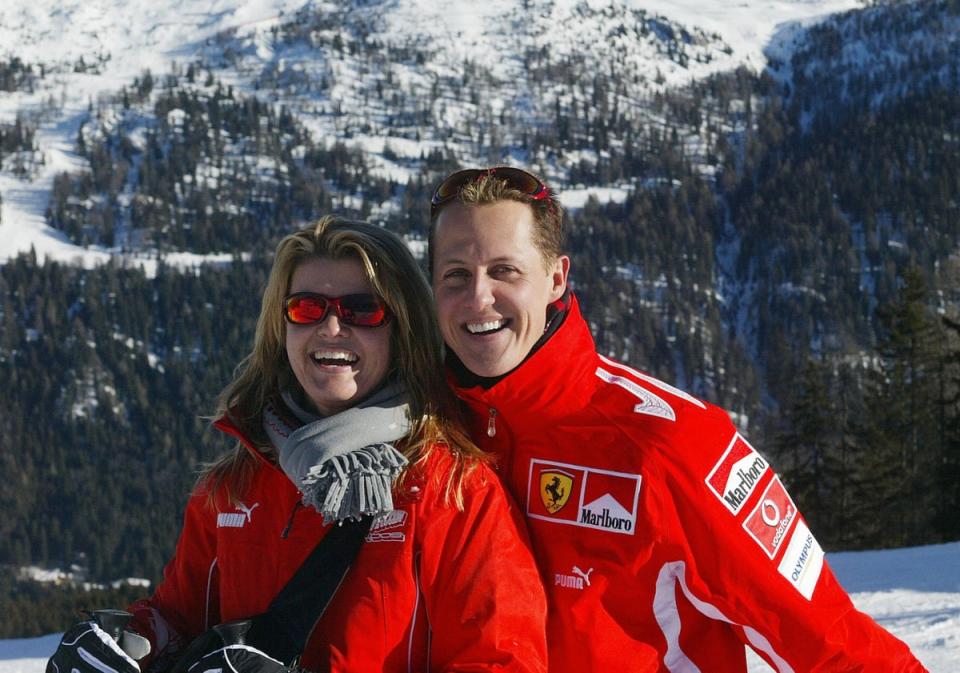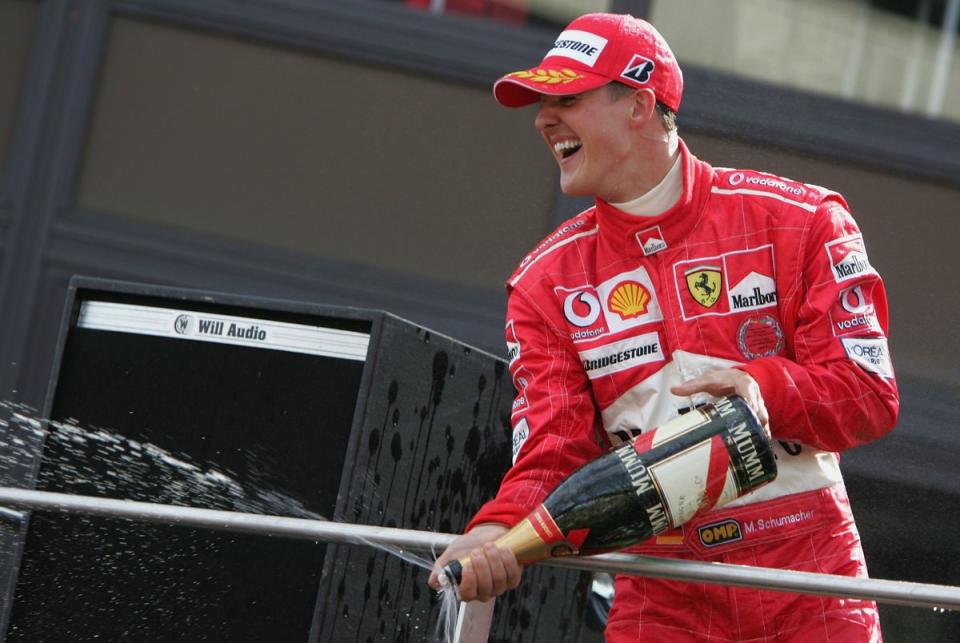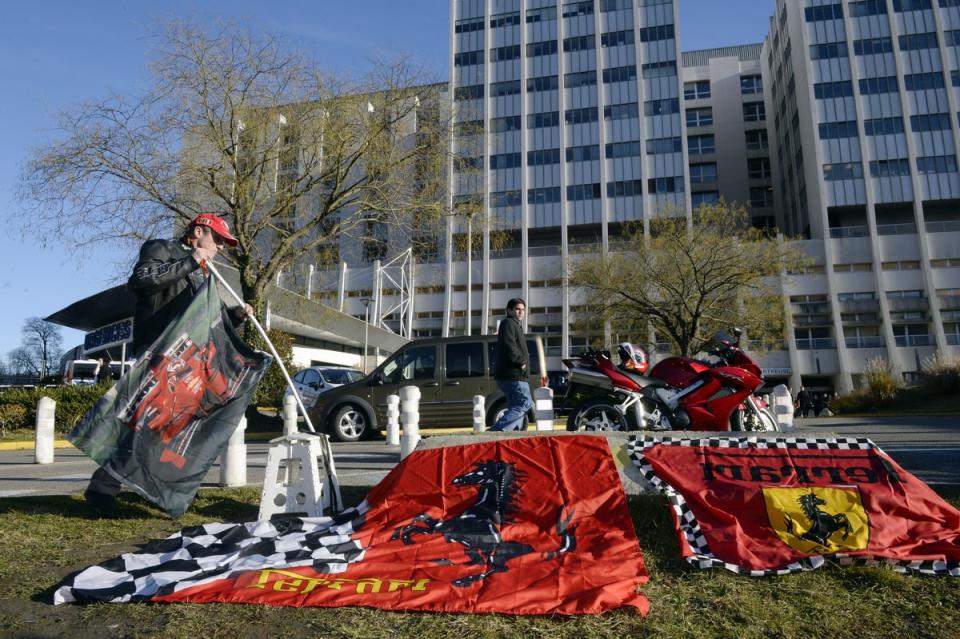Michael Schumacher: 10 years on from skiing accident, F1 icon’s stardom still shines bright
In a five-part documentary series aired a fortnight ago exclusively in Germany, the finale to the second episode of Being Michael Schumacher encapsulated quite flawlessly the emotional hold the seven-time Formula One world champion had – and still has – on the sporting world. For we are not in Germany. Nor are we at Monza or Imola, home to Ferrari’s legendary tifosi fanbase. We are in Stavelot, Belgium, five miles away from the legendary Spa-Francorchamps circuit, deep in the Ardennes Forest.
The show speaks to Gregory Lucassen-Servaty, an F1 fan based in the small municipal town. Asked to reminisce about the German driver, he tells of how Schumacher fans were “more noisy in a good sense… now it’s not the same, it’s different”. Then he precedes to describe Schumacher as his “idol”, before a statement which would be impractical if the memories and records did not support it.
“Michael Schumacher is a dream.”

The whole scene, alongside the release of a new docu-series just two years after Netflix’s own excellent Schumacher film, points the finger of influence towards a man who transcended his sport. Reaching all corners of the world, with high drama from Australia to Brazil and everywhere in between, Michael Schumacher’s legacy was complete long before his life-changing and heartbreaking skiing accident, 10 years ago today.
Spa holds a special place in the heart of Schumacher and his family. It was where he made his F1 debut in 1991, for Eddie Jordan’s Irish team. A year later, he won his first race at the sport’s longest circuit for Benetton-Ford. An unmistakable gift of speed and unparalleled thirst for perfection was quickly evident and, in 1998, Spa was home to his infamous confrontation in the pit lane with David Coulthard, following a collision in the rain which drew the curtains on both their races. Schumacher did not pull any punches and, sometimes, his intensity boiled over.
“He could be very ruthless, he could be cold, he could be distant,” Coulthard now says, of the incident and his then adversary. “I think that’s probably what, at that level, you need to be that successful. I would not be being honest in acknowledging for however great a driver he was, that there were some downsides of Michael’s really ‘win at all costs’ approach on the racetrack.”
The upsides, though, led to five straight world championships with Ferrari between 2000 and 2004. A record-breaking seven titles in total – the seventh sealed at Spa, too – subsequently matched by Lewis Hamilton. More so than any titles, however, Schumacher changed the conversation surrounding preparation and sports science in Formula One. Drivers are now fitter and leaner than ever before because of the German. From party-lovers to supreme athletes, Schumacher had the biggest impact in shifting the sport’s pendulum between sport and entertainment.
Winning was what mattered – and he’d do everything in his power to be at the top of the podium.


That meant an often-ignored human touch, too. Pat Symonds, an engineer for Benetton in the mid-Nineties, notes: “He knew every mechanic, he knew the name of their wives, he knew what the children were doing. It was genuine, it was real. Michael just immersed himself in it and of course, it meant people would do anything for him.”
It makes the current state of affairs, with the 54-year-old’s medical condition shrouded in secrecy at the request of his wife Corinna and his family, so difficult to stomach for so many around the world. Yet the paradox of the sad set of circumstances, in the decade since his accident while skiing off-piste in the French resort of Meribel, is that the deep respect for his family is for the most part adhered to.
While the thirst for information is deep, any vague updates in the years since have been limited in detail. It is a rare example in modern life that something so monumental – something which could be subject to daily front-page gossip, such is its news value – is kept so consummately private. A testament, too, to the support system surrounding Corinna, their daughter Gina-Maria and son Mick.
It is an undeniably cruel twist of fate that Mick’s ascension to F1 coincided without his father present to advise during his difficult two-year stint at Haas. Who knows how his father’s guidance could have helped his son when things looked particularly gloomy. And F1 fans everywhere will hope Mick, currently a reserve driver for Mercedes, receives another opportunity at the top table, desperate to bring back glimpses of the Schumacher a generation older.
But while the overwhelming urge on this bluest of days may be to wallow in the loss of a man not yet gone, it instead should be a time to remember Schumacher for the man he was. A man with emotion, dedication and compassion all entwined in his work. A man whose impact was so high – his blueprint left so distinctly on the sport long before his second retirement in 2012 – that his stardom continues to shine through today, despite the unknown surroundings by which he now lives his life.
